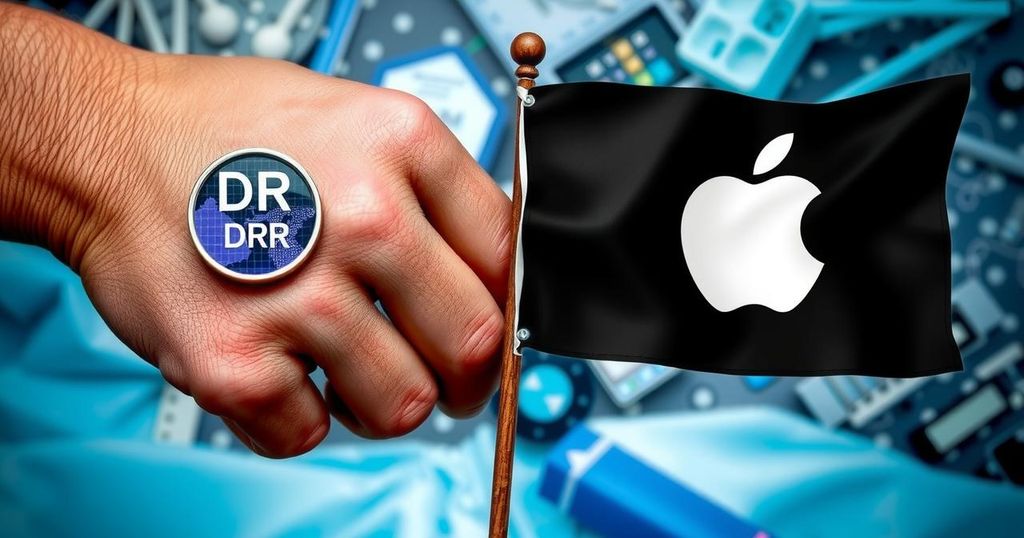DRC Initiates Legal Action Against Apple Over Alleged Use of Conflict Minerals

The Democratic Republic of Congo has lodged a criminal complaint against Apple, accusing its European subsidiaries of using illegally sourced “blood minerals” in their supply chains. Allegations include war crimes and deception, prompting a call for corporate accountability. Legal representatives emphasize the ongoing violence and human rights abuses connected to mineral extraction in the region.
The Democratic Republic of Congo (DRC) has initiated a criminal case against the European subsidiaries of Apple Inc., alleging the company has illicitly utilized “blood minerals” within its supply chains. According to the DRC’s claims, Apple procured contraband materials from regions in Eastern Congo and Rwanda, where the minerals are supposedly mined unlawfully and subsequently integrated into global supply chains for technological devices.
The DRC’s accusations extend to the French and Belgian divisions of Apple, asserting that these entities engaged in misleading advertising practices to create an illusion of ethical sourcing. Complaints have been filed in Paris and Brussels, encompassing serious allegations that range from war crimes and money laundering to forgery. Despite previous inquiries directed towards Apple CEO Tim Cook regarding the provenance of the minerals, the DRC’s legal representatives reported receiving insufficient responses.
Robert Amsterdam, representing the DRC, characterized the legal action as a significant opening salvo in efforts to hold large corporations accountable for their supply chain practices. He stated, “Color Apple red, and not green. It is a trillion-dollar company that must be assumed to know the consequences of its actions. Enough with denials of accountability!” William Bourdon, a lawyer based in Paris, emphasized that the criminal complaints mark a critical step towards ensuring accountability for Apple’s profit-driven policies that allegedly contribute to grievous crimes affecting African supply chains.
Christophe Marchand, another attorney from Brussels, noted that the complaints hold significant public interest. He highlighted the growing scrutiny by European nations and organizations regarding international supply chains. The legal representatives cited extensive detrimental impacts on civilians due to the exploitation of minerals, which has allegedly financed militant activities and contributed to forced child labor. The involvement of international investigations by the United Nations and NGOs underscores the critical nature of this issue.
Furthermore, the DRC has approached European Commission President Ursula von der Leyen to bring attention to these criminal complaints and seek cooperation for accountability within mineral supply chains in sub-Saharan Africa. In response to the allegations, Apple asserted last year that it had “no reasonable basis for concluding” that its products contained illegally sourced minerals, while the Rwandan government dismissed the claims as baseless, accusing the DRC of attempting to deflect blame.
The DRC’s eastern region has experienced persistent violence since the 1990s, exacerbated by a renewed offensive from Rwandan-supported rebels, intensifying accusations against Rwanda regarding its involvement in DRC’s mineral-rich territories.
The allegations against Apple arise in the context of ongoing conflicts within the Democratic Republic of Congo, particularly in the eastern regions rich in mineral resources. Minerals from this area, often referred to as “blood minerals,” are mined under dire conditions, with reports suggesting that their extraction is linked to funding armed groups and human rights abuses. This situation has drawn international scrutiny, as technology companies relying on these materials face increasing pressure to ensure their supply chains do not support unethical practices. Prior investigations by organizations like the UN have highlighted the scale of violence and exploitation associated with the extraction of these minerals, prompting legal actions aimed at holding corporations accountable for their sourcing decisions.
In summary, the Democratic Republic of Congo has taken legal measures against Apple, accusing the tech giant of using illegally sourced minerals from conflict zones. The allegations include serious accusations such as war crimes and financial misconduct. This case represents a pivotal moment in the pursuit of accountability for corporate practices impacting marginalized communities globally. The outcome could have significant implications for corporate governance regarding ethical sourcing and the broader issue of conflict minerals.
Original Source: www.rfi.fr







